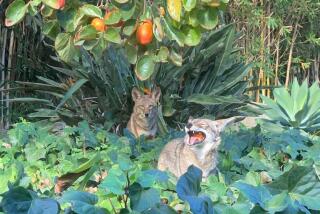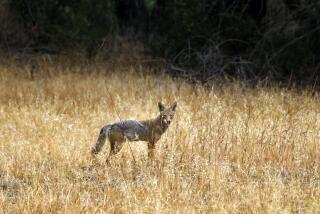Reinstitute Sensible Trapping Policy
- Share via
One heartening aspect of the coyote trapping debate last month was that neither side supported random trapping to eradicate coyotes. Those in favor of the ban testified as to the consequences of major reduction in the coyote presence. Frightened residents--not only in the foothills, but far into densely populated parts of Encino, Tarzana and Reseda--asked only for deterrent trapping to safeguard their families and pets from aggressive or “nuisance” coyotes who enter yards and garages, linger in driveways and stalk or attack small pets. So the controversy is clearly not the number of coyotes but their demeanor and location.
An animal expert (well-trained in canine identification) reported spotting a coyote crossing the busy intersection of Balboa and Roscoe boulevards at midday recently. And a resident of Silverlake, near downtown Los Angeles, recently saw two coyotes digging under her fence to reach her German shepherd, while five more watched nearby. The brushy abutments to our sprawling freeway system provide easy travel corridors for the coyote, and it is obvious that soon no one in this city will be able to remain dispassionate on this issue.
Is it really good for the coyote to encourage it to lose its natural, protective avoidance of humans? Do we want coyotes with painful bullet wounds roaming our streets, dying slowly of toxemia? Is it kind to let them contract diseases to carry back to their dens? Is it truly humane for them to live freely in urban areas where they will be hit by cars, drag themselves into the brush areas by freeways (as do many companion dogs) and lie there with maggot-infested wounds, unreported until a transient stumbles over them and is bitten?
The coyote is not a domestic pet and will not be subject to any civilized regulation. It will receive no medical care, no inoculations, and will not be spayed or neutered. It will urinate and defecate in our streets (with resultant sanitation problems), cause traffic accidents and reproduce to fill an almost unlimited available space and food supply. It will breed freely with domestic dogs, causing additional animal control problems.
We do not have to be extreme to be humane. Let’s try to keep the coyote from hurting itself and others by reinstituting a sensible trapping policy to encourage it to retreat to the wildlands. Let’s assure we do not merely save its life, but that it stay where its life is worth living.
PHYLLIS M. DAUGHERTY, Los Angeles






